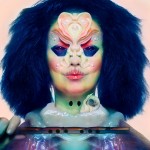Björk is back and weirder than ever with her latest release, “Utopia.”
The Icelandic singer-songwriter’s first major release of new music since 2015’s “Vulnicura” combines a rustic aesthetic with a more modern, electronic element to create a complex yet overall harmonious album. “Utopia” expands upon Björk’s infamous avant-garde sound, ultimately creating a rich and charming album.
The album plays much like a movie – it’s difficult to listen to in pieces. Listening to any song out of order, or in a playlist with other songs is somewhat jarring. The music on “Utopia” doesn’t fit into a single genre – it encapsulates the innovative and cutting edge quality that is characteristic of Björk’s music, which frequently combines older classical and folk elements with modern electronic techniques.
On the album’s third song “The Gate,” Björk sings out in Latin-esque gibberish with woodwinds playing faintly in the background. The minute-long intro mimics the sound of a church choir, building up a sense of anticipation as it slowly transitions into the rest of the song. The remaining five and a half minutes of the song integrate electronic beats and synthetic instruments, which lends the chorus and verses a spacey feel.
The album continues on to the title song, “Utopia,” with an intro that sounds like it’s taken straight out of the soundtrack from an old Disney movie, featuring an upbeat flute tune with birds singing in the background. Just before Björk begins singing, the sound of footsteps running briskly through the grass sounds over an electronic beat, as if she’s performing the song in an extraterrestrial forest.
Björk uses the bird sounds as a musical device throughout the album. “Paradisia” is composed entirely of bird’s chirping and flutes while the song “Saint” opens up with what sound like waterfowl and seagulls chanting. The birds give the album a pleasantly organic and unrefined feeling, as if the listener is hiking with Björk through the woods.
The album feels like an ode to biology and the natural world – in addition to implementing bird sounds throughout the album, Björk frequently evokes the outdoor world in her lyrics. On the title track, she chants about purifying the air – a nod to climate change activism – while on “Arisen My Senses,” she sings about all of the cells in her body. With its outdoorsy aesthetic and synthetic production, the album feels like the lovechild of Disney’s “Bambi” and FKA Twigs’ “LP1.”
While the album’s lyrics are thought-provoking and the musical aesthetic is as pleasant as ever, the album would fall flat if it weren’t for Björk’s vocal chops. The singer-songwriter balances soft and quiet vocals with loud and booming notes, creating a complex texture in each song.
On “Tabula Rasa,” Björk harmonizes with herself, going into a high head voice on one layer while loudly belting out phrases on another. Although Björk doesn’t necessarily have the most powerful voice in the music industry, she manages to make do with what she’s got – a crisp and rich voice with a fascinatingly creaky, but by no means weak, texture.
As musicians continue to experiment with different musical genres this year – Kesha switching over to a more country-folk sound, and St. Vincent taking on a more pop style – it’s refreshing to hear an artist sticking to her roots. While “Utopia” certainly expands upon Björk’s historically strange and avant-garde sound, at the end of the day, it’s clear that she is sticking to the formula that’s worked for her throughout her decades-long career: utter weirdness.
